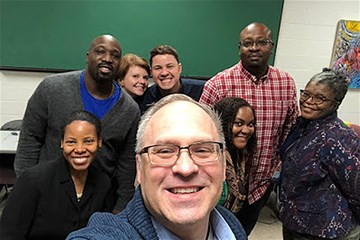There were a lot of questions from the first day of class all the way through the last day of class. Addictions, both substance-related and behavioral addictions, and social support were among the topics of discussion and study during the Addictions Recovery Ministry course during the January term (J-term) class at Wesley Theological Seminary.
Wesley Theological Seminary is one of the 13 United Methodist seminaries supported by the Ministerial Education Fund apportionment of the United Methodist Church.
The students flew fast starting on the first day of class. They were taken aback by the responses of the opening group exercise. The class was asked to list 5 characteristics of an addict or an alcoholic. Addiction behaviors and appearances were listed; however, the small groups neglected to remember persons with addiction are also children of God. It set the tone for the remaining two weeks of class, indicating the stigma individuals with addiction issues face, even in the life of the church.
They came from the diverse group of students, even though most in this pastoral care and counseling course had some exposure or personal experience with addiction. The course provided an overview of the bio-psycho-socio-spiritual aspects of addiction, which included understanding of it as a chronic disease.
Deepening self-awareness was a significant part of the course that fostered theological conversations, not only to move away from the denial that persons with addictions and their families often face, but to encourage ministry leaders to recognize triggers, biases, and potential burnout. The complementary side of self-awareness is that it can assist persons to be attuned to God's presence, to be more receptive to guidance from the Spirit for Christian service and to improve self-care.
Part of the learning process and course study focused on how individuals, including clergy, are susceptible to addiction problems. In the journey to understanding support, the class learned that Alcoholics Anonymous and Narcotics Anonymous, both of which are 12 Step type groups, typically do a better job of welcoming individuals with addiction than churches do.
Churches sometimes shy away from being involved because of uncertainty or distrust, perhaps even feeling overwhelmed with some of the needs persons and families may face. Once we move away from judgment and fear, we can offer grace and care in the form of ministry programs. It's important for us to remember that those of us who have more hope have a Christian responsibility to share it.
Most pastors are not addictions counselors, but we can share in the human service work and/or lead others in doing so, said Marci Matthews, the daughter of Bishop Marcus Matthews, who was one of the students. If we are not recognizing the signs and struggles of addiction in our parishes, then we are not wanting to see it.
The need is there. The struggle is real. Thankfully, Christ's presence is too, and we all can help shine His light in places of darkness.
Rev. Leo Yates, Jr., Wesley Theological Seminary
One of seven apportioned giving opportunities of The United Methodist Church, the Ministerial Education Fund is at the heart of preparing people for making disciples of Jesus Christ for the transformation of the world. The 13 United Methodist seminaries help students to discover their calling through the challenging curriculum. The fund enables the church to increase financial support for recruiting and educating ordained and diaconal ministers and to equip annual conferences to meet increased demands. Please encourage your leaders and congregations to support the Ministerial Education Fund apportionment at 100 percent.





